2021 KIP Project "Young People's Anxiety in the COVID-19 pandemic"
This year, we will conduct a questionnaire survey to find out what kind of anxiety young people have in the COVID-19 pandemic, and propose and implement what we can do about it. Our purpose is that what we can do contribute to alleviating the anxiety of young people. The contents of the research survey and the proposals and implementation will be shared through a report and a presentation at the KIP Symposium in March 2022.
(The "the COVID-19 pandemic" refers to the period from April 2020 to the present.
Table of Contents
Ⅰ. Report on the Second Questionnaire Survey
Ⅱ. Report on the First Questionnaire survey
Ⅰ. Report on the First Questionnaire Survey
KIP conducted a questionnaire survey from August 1, 2021, to August 18, 2021, to 1004 young people aged 35 years and above who had graduated from high school about their concerns about the Corona disaster.We will share the results in a preliminary report.
Headline
1.HEALTH
2.RELATIONSHIP
3.CAREER
4.MONEY
1. HEALTH
Q1. Do you feel anxious about your current lifestyle (ex. amount of exercise, rest, sleep, meal. e.t.c)?

※The following is a list of options 1 through 5 that indicate the degree of anxiety.
1: I don't feel anxious at all.
2: I don't feel much anxiety.
3: Neither.
4: I feel a little anxious.
5. I feel a lot of anxiety.
There was a polarizing tendency among those who answered "2: I don't feel much anxiety" or "4: I feel a little anxiety.
Q2. Do you feel anxious that it is or would be difficult to see doctors because the system of medical service is getting tight?

There is a similar pattern as Q1 but there are slightly more respondents who answered “4: I feel a little anxious.”
Q3. Do you feel anxious that you might get or infect other people with COVID-19?

The majority of respondents answered either “4:I feel a little anxious” or “5:I feel a lot of anxiety.”
Summary
One can see bipolarization in Q1 and Q2, and, according to Q3, almost 65% of the respondents feel anxious about the risk of spreading and being infected by COVID-19. We would like to analyze the results of the questionnaire and conduct further research to discover if there is any difference regarding their grade( or years they spent as working adults), gender or whether they live alone or with their family.
Planned and edited by: Knowledge Investment Program, Inc.
Back to Top
2. RELATIONSHIP
Q4. Do you feel anxious about keeping good relationships with seniors or juniors at school or office?
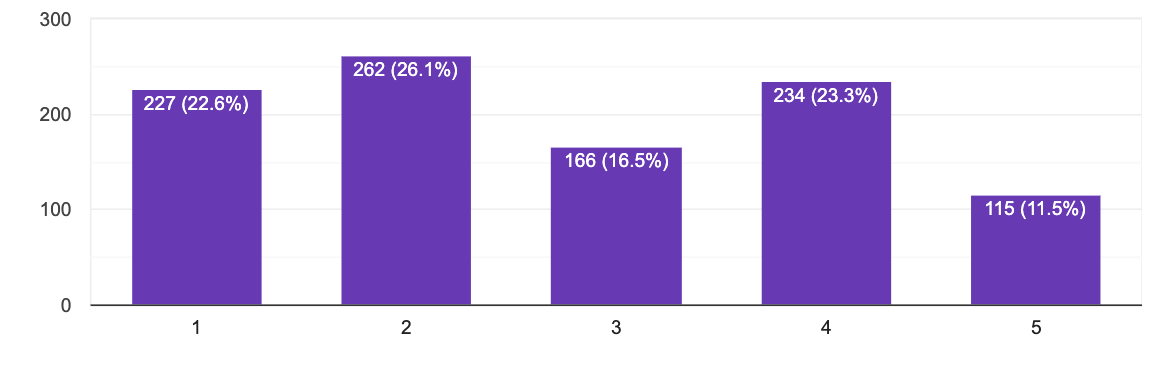
※The following is a list of options 1 through 5 that indicate the degree of anxiety.
1: I don't feel anxious at all.
2: I don't feel much anxiety.
3: Neither.
4: I feel a little anxious.
5. I feel a lot of anxiety.
The majority of respondents answered "2: I don't feel much anxiety," followed by "4: I feel a little anxious" and "1: I don't feel anxious at all.”
Q5. Do you feel anxious about making new relationships with seniors or juniors at school or at your workplace?
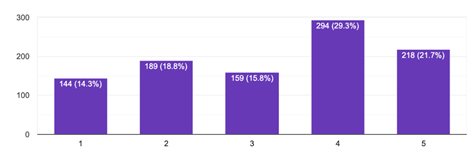
Q6. Do you feel anxious about keeping good relationships with friends?
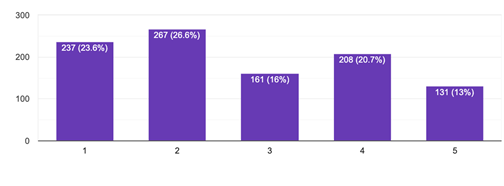
Q7. Do you feel anxious about making new relationships?
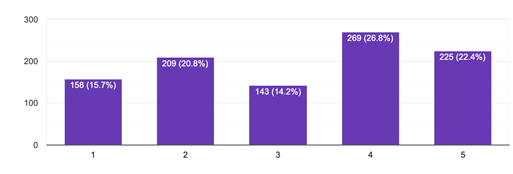
Q8. Do you feel anxious about keeping good relationships with your family?
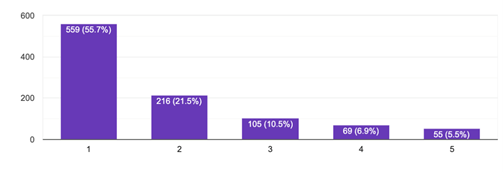
Summary
For making new relationships, many respondents chose 4 (I feel a little anxious) or 5 (I feel a lot of anxiety). On the other hand, there was some variation in the responses about keeping good relationships. For keeping good relationships with your family, the overwhelming majority of respondents chose 1 (I don't feel anxious at all). We would like to clarify the backgrounds and the reasoning of this anxiety by doing an additional survey.
Planned and edited by: Knowledge Investment Program, Inc.
Back to Top
3. CAREER
Q9. Do you feel anxious about the lack of information about your career (studying abroad, job hunting, changing jobs, etc.)?
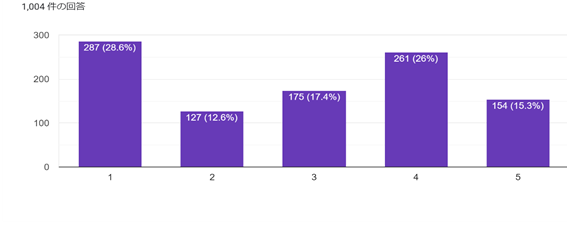
※The following is a list of options 1 through 5 that indicate the degree of anxiety.
1: I don't feel anxious at all.
2: I don't feel much anxiety.
3: Neither.
4: I feel a little anxious.
5. I feel a lot of anxiety.
About 41% of respondents answered "1: I don't feel anxiety at all" and "2: I don't feel anxiety much," while about 41% answered "4: I feel anxiety" and "5: I feel anxiety a lot.
Q10.We would like to ask questions to those who chose answers other than 1 in Q9. Which of the following information is particularly lacking? (You can choose more than one)

1. Study abroad
2. Job hunting
3. Qualification
4. Entrepreneurship
5. Go on to higher education( master,phd)
6. Job change
7. Part-time job
8. Internship
It can be seen that job hunting is the most common information that people feel is lacking, followed by studying abroad.
Q11.Do you feel anxious about whether your abilities are being evaluated correctly in job hunting, career change, academic evaluation, or work evaluation?
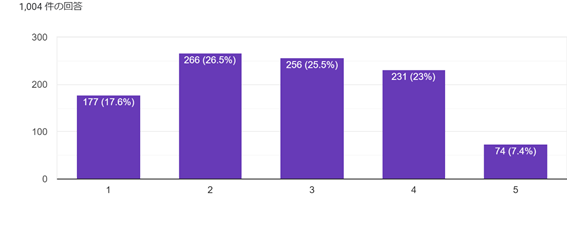
Q12.Are you concerned that you are having difficulty deepening your expertise and expanding your knowledge?
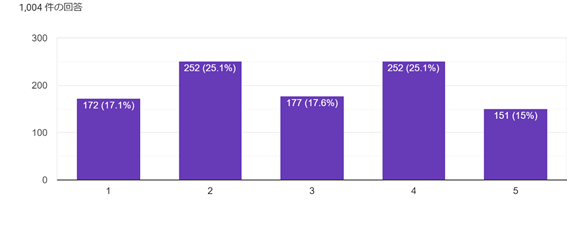
Q13.Do you feel anxious about the loss of your company/profession/occupation? If you are a student, do you feel anxious about the loss of your company/profession/occupation, including the company/profession/occupation you want to work for, or your part-time job or internship?
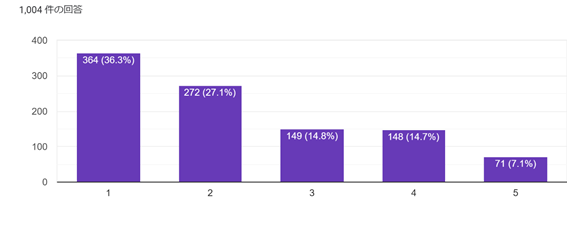
Summary
About 41% of the respondents were concerned about the lack of information about their careers. Through the second questionnaire, we would like to investigate the reasons and specific concerns of those who are concerned about the lack of information.
Planned and edited by: Knowledge Investment Program, Inc.
Back to Top
4. MONEY
Q14. Do you feel anxious about expenses in the current or in the future?
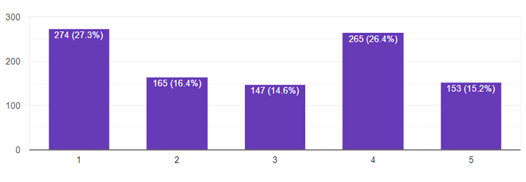
Q15. For those who chose more than 1 for the above question. Which of these expense items do you feel uneasy about financially? (You can choose more than one)

1. Food expense
2. Rent and utilities
3. Communications expense
4. Tuition
5. Entertainment expenses
6. Tax
7. Medical expense
*The total number of responses is 22, although the options with less than one response are omitted.
The most common answer was food, followed by rent/utilities and entertainment.
Q16. What is your source of income? (You can choose more than one)

1. Salary from the company (including work as an intern or part-timer)
2. Bonus from the company
3. Earning money as a self-employed/freelance worker
4. Support from the parents
5. Asset management
6. Scholarship
*The total number of responses is 12, although the options with less than one response are omitted.
The majority of respondents (76.4%) answered that they receive their salary from their company. Many people, 63.1%, received support from their parents.
It can be seen that about 30% of the respondents have concerns about competency evaluation.
Q17. Which of the following sources of income do you feel uneasy about because of the possibility of a decrease in revenue? (You can choose more than one)

1. Salary from the company (including work as an intern or part-timer)
2. Bonus from the company
3. Earning money as a self-employed/freelance worker
4. Support from the parents
5. Asset management
6. I don’t feel uneasy.
*The total number of responses is 8, although the options with less than one response are omitted.
While more than half of the respondents answered that they had no fear of a decrease in their income, about 30% of them said that they were worried about the possibility of a decrease in their salary from their company (including part-time jobs and internships).
Summary
As for anxiety about expenses, most of the respondents chose “1:I feel no anxiety at all” and “4:I feel a little anxiety.” We would like to clarify why those who feel anxious feel anxious through questionnaire analysis and additional surveys.
Planned and edited by: Knowledge Investment Program, Inc.
Back to Top
Ⅱ. Report on the Second Questionnaire Survey
From September 26 to October 22, 2021, The KIP Project team conducted a questionnaire survey of 411 young people aged between high school graduation and 35 years old, focusing on their concerns about online communication, among other concerns about the COVID-19 pandemic . The results are shared in this content.
Notification
*Online communication tools SNS (LINE, Twitter, etc.), online meeting tools (zoom, teams, etc.)
**Formation of new relationships] Becoming friends with people you didn't know before, regardless of age , position, location or group of race.
Q1. How anxious are you about forming new relationships?

The results were split almost 50-50, with 48.7% of respondents saying they were "not at all (anxious)" or "not so much (anxious)," and 51.3% saying they were "a little (anxious)" or "a lot (anxious)”.
Q2. Do you think that the decrease in face-to-face meetings is affecting the formation of new relationships?

We found that 90.2% of the respondents answered "totally" or "a little," indicating that a significant number of people think that face-to-face meetings contribute to constructing new relationships.
Q3. Do you think online communication tools are useful to help you with building new relationships?

※Blue: “I don’t think so at all”, Red: “ I don’t think so much”, Yellow: “I think they are a little useful", Green: “I think they are quite useful"
75.2% of the respondents answered “I think they are quite useful" and “I think they are a little useful", while 22.1% answered “I don't think so much".
Q4. How often do you use online communication tools (for private purposes only)?

※Blue: “Not at all”, Red: “Not so much”, Yellow: “A little”, Green: “A lot”
86.8% of the respondents answered that they used them “A lot” and used them “A little”, and 13.1% answered that they did not use them at all and did not use them much. After Q6, we asked the questions separately for those who use them and those who do not.
Q5. How long do you use online communication tools on average per day (for private purposes only)?

※Blue: Under 30 minutes, Red: Under 1 hour, Yellow: 1-2 hours, Green: 2-3 hours, Purple: 3-4hours, Light blue: 4-5hours, Pink: Over 5 hours
29% of the respondents answered "1-2 hours", followed by 21.9% who answered "2-3 hours", 17.8% "less than 1 hour", and 15.6% "less than 30 minutes". Continued.
<For those who answered "I don't use online communication tools* at all" or "I don't use them much” in Q4 (Below is a list of people who do not use online communication tools.)>
Q6. Would you like to use more online communication tools* for personal purposes?

※Blue: Yes Red: No
About 70% answered "yes" to this question.
Q7-1(If you answered "No" in Q6) What kind of opportunity would you like to have in order to start using them?
Multiple responses were received, and we would summarize them into three main opinions.
・If there is someone I want to contact (a very close friend, lover, etc.)
・When the need arises, such as when Online communication is the only means of communication.
・When the quality of Online Communication is as good as face-to-face communication.
Q.7-2(If you answered "No" in Q6)What are your expectations when you start using online communication tools?
Although multiple responses were received, they could be summarized into three major opinions.
・Ease of use in terms of functionality
・A friend who use the online communication tools
・Relieving loneliness
<(For those who answered "I use online communication tools a little" or "I use online communication tools a lot" in Q4)>
Q8: Do you feel that you are successfully using online communication tools* for personal purposes?
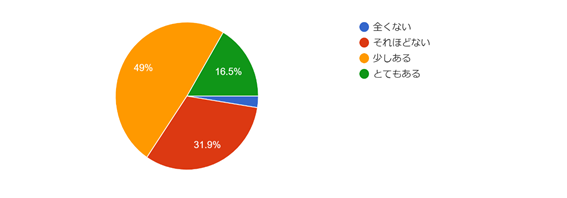
※Blue: “Not at all”, Red: “Not so much”, Yellow: “A little”, Green: “A lot”
About 19% answered "Not at all" or "Not much," and about 80% answered "A little" or "A lot.”
Q9. Compared with face-to-face communication, do you feel it is difficult to grasp the psychological distance between you and the other person when using online communication tools*?
(For those who answered "Not at all" or "Not much" to "Do you have a sense that you are using online communication tools* for private purposes well? ), and those who answered "A little" or "A lot" in Q8.)
[Those who have no sense of being able to use online communication]


Of those who had no sense of being able to use online communication, 87.0% answered that they felt "A little" or "A lot" of psychological distance, while 85.1% of those who had a sense of being able to use online communication answered that they felt "A little" or "A lot" of psychological distance. The difference was 1.9 percentage points.
Q10. Do you feel it is more difficult to talk to people you meet for the first time using online communication tools* than in person?
[Those who have no sense of being able to use online communication]


While 67.5% of those who did not feel that they were using online communication tools answered "A little" or "A lot," 64.1% of those who felt that they were using online communication tools answered "A little" or "A lot”.
Of those who felt they could use online communication, 67.5% answered "A little" or "A lot," while 64.1% answered "Sometimes" or "Often," a difference of 3.4 points.
Q11-1. Do you feel jealous when you see other people's SNS?
[Those who have no sense of being able to use online communication]
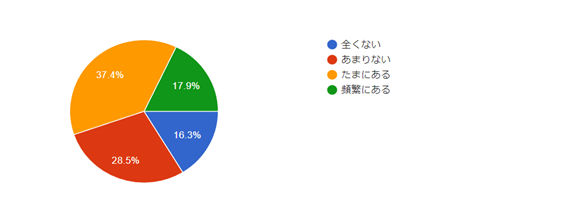

Of those who did not have a sense of being able to use online communication, 55.3% answered "sometimes" or "often," while 58.9% of those who had a sense of being able to use online communication answered "Sometimes" or "Often”.
Q11-2: When do you feel envious?
The main answer was when they saw a post about “Travel and gourmet food.”
On the other hand, there were responses such as "mutual friends playing" and "meeting with a large group of people," where respondents felt alienated by not being included in the conversation or hangouts of their friends.
Q.12-1. Do you ever attend conferences or events that have both in-person and online participants?
[Those who do not use online communication tools]
(Those who ansewered "Not at all" or "Not so much" in "Q4. How often do you use online communication tools (for private purposes only)?"")
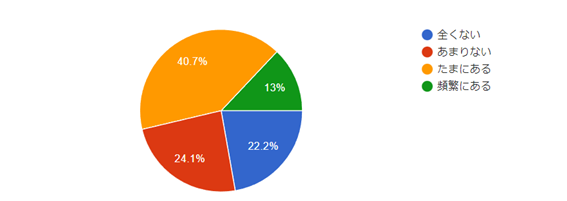


Q12-2(if you answered “Seldom”, “sometimes” or “often” in question12-1) Do you often take part in activities online?
[Those who do not use online communication tools]



The percentage of those who rarely use online communication tools who answered that they participate online "Often" or "sometimes" was 62%. On the other hand, 65.9% of those who use online communication tools frequently answered that they participate online "often" or "sometimes" if they feel they are using the tools, while 74.5% of those who do not feel they are using the tools answered that they participate online "often" or "sometimes. The percentage was higher for those who use online communication tools and feel that they can use them.
Q12-3. (if you answered “Seldom”, “sometimes” or “often” in question12-2) Do you feel separated from people who join the activities in person?
[Those who do not use online communication tools]



While 36.0% of those who do not use online communication tools answered that they "often" or "sometimes" feel alienated from face-to-face participants when they participate online, a total of 64% answered "not often" or "never". The overall trend showed that many people do not feel alienated very often. On the other hand, around 60% of those who use online communication frequently, regardless of whether they feel they are using it or not, answered that they feel a sense of alienation "often" or "sometimes," which is about 25 percentage points higher than those who do not use online communication.
Q12-4 (For those who answered "Sometimes" or "Often" in Q12-3) Why did you feel that sense of alienation?
We collected a variety of opinions, but they could be summarized into three main categories.
1. Technical problems such as time lag, difficulty in hearing voices, difficulty in seeing facial expressions, etc., hinder communication.
2. The frequency of the face-to-face participants' comments is too high, making it difficult for the online participants to speak up.
3. Difficulty in chatting and small conversations, making it difficult to feel the atmosphere of the place and to have smooth communication.
Q12-5. (For those who answered "Not at all" or "Not much" in Q12-3) Why do you think you did not feel such a sense of alienation?
There were a variety of opinions, but they could be summarized into four main categories.
1. When online participants account for a certain percentage of the total number of participants, it would prevent communication only among face-to-face participants from happening.
2. When there is a clear purpose for participating, such as a class or meeting, each person has a role to play and is less likely to be left behind.
3. The moderator and other meeting organizers give sufficient consideration to online participants and take appropriate measures, such as providing opportunities for them to speak.
4. Respondents are familiar with online participation.
Q13-1. Do you feel a physical or mental burden when using electronic devices such as smartphones or PCs?
[Those who do not use online communication tools]
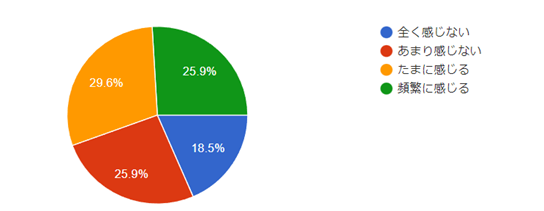
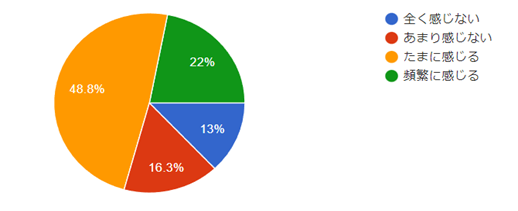
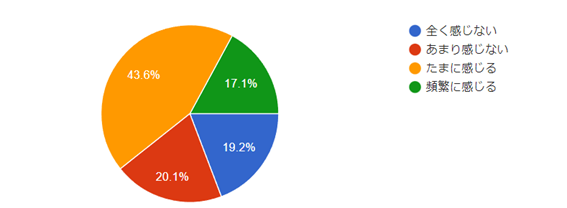
55.5% of the respondents who do not use online communication answered "sometimes" or "often. The same percentage of those who did not feel that they could use online communication was 60.8%, and the percentage of those who felt that they could use online communication was 60.7%. Regardless of whether they felt they could use online communication or not, those who used it more often were about 5 percentage points more likely to say they had a physical or mental burden.
Q13-2. (For those who answered, "Not often," "Sometimes," or "Often") When do you feel a physical or mental burden?
The most frequently cited physical burden was "when I feel tiredness in my eyes" and "when I feel stiff in my shoulders. On the other hand, the most common mental burden was "the mental pain of returning text messages.
Q14 Do you have close friends who have the opportunity to talk face-to-face?
[Those who do not use online communication tools]
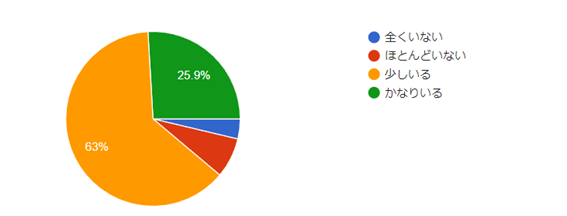


Of those who do not use online communication, 88.9% answered "a lot" or "a little. The same percentage of those who did not feel that they could use online communication was 87.8%, and the same percentage of those who felt that they could use online communication was 93.2%. There was a 5.4 point difference in the percentage of respondents who had a sense of being able to use online communication.
<(For those who answered "I use online communication tools a little" or "I use online communication tools a lot" in Q4)
Q15. Are you satisfied with your current relationships?
[Those who have no sense of being able to use online communication]


The percentage of those who answered "satisfied" or "somewhat satisfied"with their current relationships was 65.0% among those who did not feel they were using online communication, while the percentage of those who felt they were using online communication was 82.2%, 17.2 points higher.
Q16. Are there any people you met on the online communication tool that you can talk to intimately?
[Those who have no sense of being able to use online communication]


The percentage of those who felt that they could use online communication was 82.2%, 17.2 points higher than that of those who felt that they could use online communication.
Those who do not have a sense of using online communication and those who have a sense of using online communication
There was no significant difference in the tendency between those who "do not have a sense of using online communication" and those who "have a sense of using online communication.
Those who answered "A lot" or "A little" accounted for around 40% of the total for both, while those who answered "Not at all" or "Not so much" accounted for the remaining 60%. The percentage of "not at all" was 14 points higher among "those who have no sense of being able to use online communication" than among "those who have a sense of being able to use online communication.
Q17. Are you satisfied with the relationships in online communication?
[Those who have no sense of being able to use online communication]


[Those who did not feel that they could use online communication]
There was a difference between those who did not have a sense of being able to use online communication and those who had a sense of being able to use online communication.
[Those who did not feel that they were able to use online communication]
Nearly 50% of the respondents who did not have a sense of online communication were dissatisfied with their online communication relationships. On the other hand, nearly 70% of those who felt that they were using online communication were " A little satisfied" (50.4%) or "Satisfied" (20.9%), indicating their satisfaction with online communication.
Planned and edited by: Knowledge Investment Program, Inc.
Back to Top


